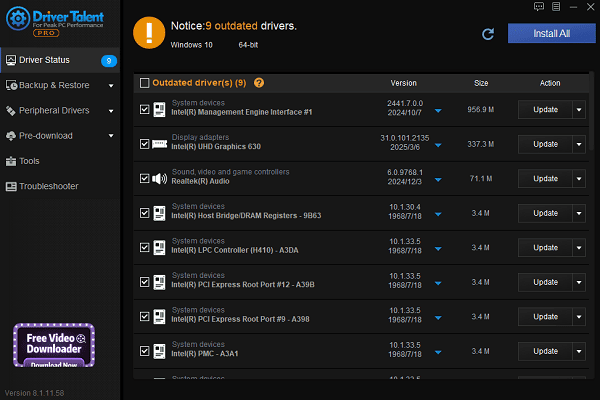
Some Windows users have reported issues with their HID-compliant mouse not working properly—such as a frozen cursor, unresponsive clicks, or the device not being recognized at all.
This article will explore the common causes of HID-compliant mouse failures and offer practical solutions to help you restore full mouse functionality quickly.
1. What Is a HID-Compliant Mouse?
A HID-compliant mouse is a standard USB or Bluetooth input device that can be recognized by Windows using generic drivers, without the need for dedicated software. It supports basic operations like movement, clicking, and scrolling, and represents the default mode for most mouse.
2. Common Symptoms of a Non-Working Mouse
The mouse cursor does not move at all
Mouse clicks are unresponsive
Device Manager shows the mouse as an "Unknown Device" or with a yellow exclamation mark
Windows displays the error "This device cannot start (Code 10)"
The mouse works intermittently or only occasionally
3. Possible Causes of Mouse Malfunction
Hardware connection issues: Loose USB ports, damaged cables, or faulty mouse hardware.
Driver problems: Corrupt or conflicting system drivers.
Power management settings: Windows may disable USB ports to save power.
System updates or software conflicts: Driver compatibility issues after Windows updates or conflicts with recently installed software.
Malware or virus interference: Malicious software might disrupt mouse drivers or system settings.
4. Solutions to Restore Mouse Functionality
1). Check Hardware Connections
Unplug and reconnect the mouse; try a different USB port.
Test with another mouse to confirm if the issue is hardware-related.
For wireless mouse, check the battery or re-pair the device.
2). Update the Mouse Driver
Outdated or incompatible drivers are a common cause of mouse failures. Using a driver update tool like Driver Talent can automatically detect and install the correct driver, saving time and reducing the risk of errors.
Download and install the latest version of Driver Talent. Launch the software and click "Scan".
Locate the mouse driver in the results and click "Update".

Restart your computer to apply changes.
3). Disable USB Selective Suspend
Open Control Panel > Power Options > Change plan settings.
Click "Change advanced power settings".
Find "USB settings" > "USB selective suspend setting" and set it to "Disabled".

Save changes and restart your PC.
4). Run Hardware and Devices Troubleshooter
Go to Settings > Update & Security > Troubleshoot.
Click "Additional troubleshooters", then select "Hardware and Devices".
Click "Run the troubleshooter" to let Windows detect and fix issues automatically.

5). System Restore or Windows Update
If the issue started after a recent update, try restoring the system to a previous restore point.
Check for new Windows updates and install the latest patches to resolve known compatibility issues.
6). Scan for Malware
Run a full system scan using a reliable antivirus program.
Remove any detected malware to restore system integrity.
5. Tips to Prevent HID-Compliant Mouse Issues
Regularly check and clean USB ports and mouse connections
Avoid frequent unplugging to minimize hardware wear
Keep Windows and drivers up to date
Install software only from trusted sources to reduce malware risk
With the hardware checks, driver updates, power management tweaks, and troubleshooting steps outlined in this guide, most HID-compliant mouse problems can be resolved effectively. If none of these methods work, consider contacting the mouse manufacturer or a professional technician for further assistance.
See also:
Canon CanoScan LiDE 100 Not Recognized? Try These Fixes
How to Fix Knup Keyboard Connection Issues – Working Driver Solutions
Canon IR2520 UFRII LT Driver Not Recognized? Try These Fixes
Can't Print with HP LaserJet M1120 MFP? Complete Troubleshooting Guide









